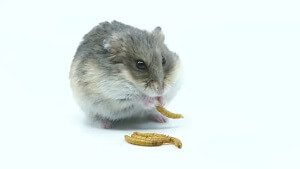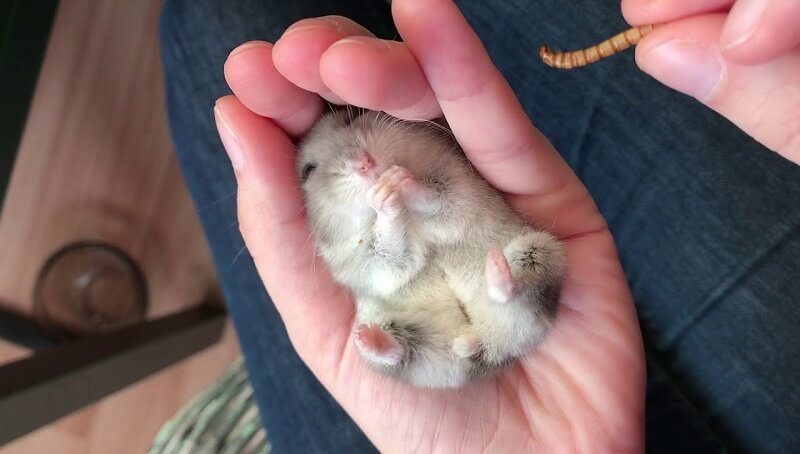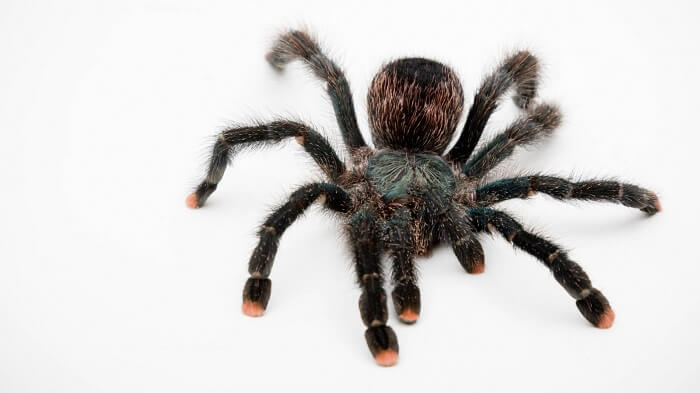Hamsters are omnivores, which means wild hamsters eat a mixture of plants and insects. The best diet for your hamster is the one that is similar to what it would eat in the wild, including fresh vegetables and protein-rich items such as mealworms.
So, the answer is a resounding yes. Dried mealworms are a wonderful and nourishing addition to your hamster’s diet. They provide a plus of protein, fat, and fiber. The mealworms are also rich in saturated and monounsaturated fatty acids.
The safest way to feed your hamster mealworms is dried, so they won’t get the chance to nest in your hamster’s mouth, as they tend to stuff their food into their cheek pouch.
Why are worms good for hamsters?
The nutrition plan for hamsters has to be supplemented with the animal component. In the wild, hamsters feed on insects among other things. Therefore, hamsters should also receive animal protein three to four times a week, which is best fed directly from your hand.
You might also like my articles on whether hamsters can eat bread and oranges.
The mealworms are particularly suitable for them because they have a high-fat content and many vitamins. They are an excellent source of vitamins K, B12, and calcium.
Are worms healthy for hamsters?
Worms can be included in a hamster’s diet as long as you chose the proper ones to be fed. Animal shops offer you a vast variety, but the best ones are dried mealworms. They are recommended to be offered as a treat as they are rich in essential nutrients and fat-free.
Even though they are good for your pet’s health, moderation is the key, because if your hamster eats too much, obviously they become too fatty.
Can I feed my pet hamster worms every day?
No, you shouldn’t feed them every day; 2 or 3 times a week is more than enough.
Some owners notice that their hamster has days when it totally refuses to eat and it is ok to let your pet digest its food in its own rhythm.
Can worms cause infection in hamsters?
 People that offer alive mealworms to their hamsters always ask themselves if mealworms bite.
People that offer alive mealworms to their hamsters always ask themselves if mealworms bite.
No. Like super worms, mealworms have a jaw, but it seems to be too small and weak to be useful in biting. Mealworms do not seem to be able or capable of biting.
The biggest problem when you offer your hamster alive worms is the high probability of getting an infection as they might not be able to digest them well. In most cases, you should see a veterinarian if your pet feels sick and has a temperature.
Another cause of the infection might be a blockage in its digestive system. This happens if your hamster eats worm larvae, alive worms, or too many dried worms at once.
Regardless of the type of worms you choose to offer your hamster, they should always be dried and fat-free.
Why does my hamster refuse to eat mealworms?
A hamster won’t starve, so he’ll eat them. Maybe you could crush a few and give them as a treat.
Another idea is to mix crushed mealworms with a small amount of flour, water, small seeds, and perhaps a little peanut butter. You can offer them in this way so they won’t waste the mealworms.
If the hamster is in a closed terrarium or a special cage, you can occasionally give it crickets or worms. They contain many proteins necessary for them and these are also safe.




